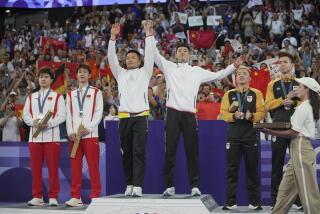Beijing’s Joy Quickly Turns to Tears
- Share via
BEIJING — Residents of Beijing--where government officials had hoped the glory of hosting the Olympic Games would erase the stigma of the 1989 crackdown at Tian An Men Square--reacted first with joy when they thought they had won the competition for the 2000 Games, then with stoic dejection and tears when they learned they had lost it to Sydney, Australia.
Before the announcement, Chinese authorities intensified security with paramilitary People’s Armed Police in the central Tian An Men Square area and around the U.S. Embassy compound, where it was feared that the Olympic decision might spark anti-American demonstrations because of U.S. congressional opposition to Beijing’s bid.
On the campus of Beijing University, more than 1,000 students who were gathered in front of three television screens broke into a roar of approval when Juan Antonio Samaranch, president of the International Olympic Committee, mentioned Beijing first in his list of congratulations to the five finalist cities.
“A roar went up, a few fireworks--then silence when the announcement came that Sydney was the choice,” said Richard Baum, a UCLA political science professor, who was on the Beijing University campus when the announcement was made early this morning, Beijing time.
After the initial shock subsided, the students quietly filed from the central campus Triangle building. “It was quite somber. Sort of a dud,” said Baum, a China scholar and visiting lecturer at the university. “They were all there ready to have a party, but nothing happened.”
Similar scenes were repeated all across the Chinese capital, where the announcement was broadcast live from Monte Carlo by the main Chinese government television network.
At another university active during the 1989 pro-democracy movement, students threw bottles from dormitory windows and shouted angry slogans deriding Sydney. Some of the students blamed the U.S. Congress, which passed a resolution opposing a Beijing Olympics.
“The American Congress blew the problems here out of proportion,” one student said. “They mixed up sports and politics. It was unfair.”
Another student on the same campus was more resigned. “I’m sad,” she said, “but we will surely win in 2004.”
“The American Congress said some bad things about China. They put pressure on the Olympic Committee, but we know it was not the . . . Congress that decided, and China made some mistakes in its bid.”
Chinese officials and organizers of Beijing’s Olympic bid sought to make the best of the defeat, partly to offset the perceived threat earlier by a senior Olympic official that China might consider boycotting the Atlanta Games in 1996 if Beijing did not get the 2000 Games.
Although enthusiasm for the 2000 Games had been lukewarm at first among the Beijing populace, irritated by the constant highway and infrastructure construction work undertaken by the government to make Beijing a more attractive candidate, hosting the Games had recently taken on considerable popular support.
Political figures as diverse as Premier Li Peng, the man many feel was responsible for the Tian An Men Square crackdown, and the recently released longtime political prisoner Wei Jingsheng, came out in support of the Olympic bid. The city is festooned with thousands of banners and hundreds of giant billboards and neon signs promising “a more open China” if Beijing were granted the 2000 Games.
Times researchers Kevin Platt and Elisabeth Grinspoon, in Beijing, contributed to this report.
More to Read
Go beyond the scoreboard
Get the latest on L.A.'s teams in the daily Sports Report newsletter.
You may occasionally receive promotional content from the Los Angeles Times.






